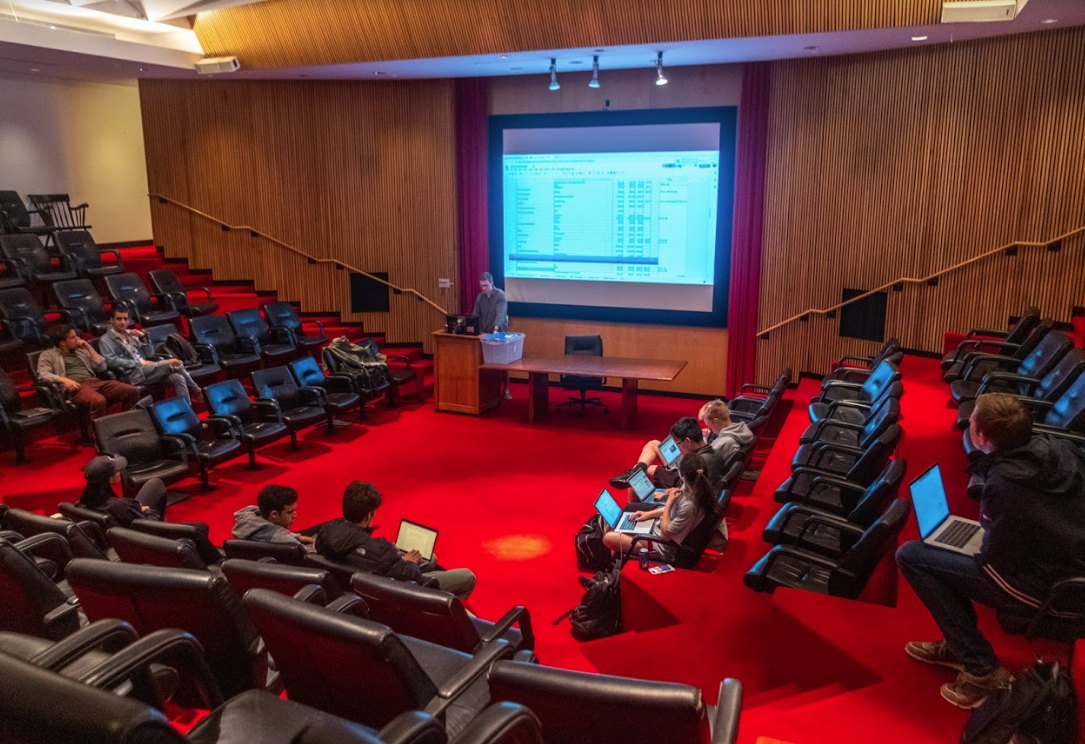AAS Voids Election, Disqualifies Ticket

On April 9, the Judiciary Council (JC) issued a decision on a complaint regarding the recent Association of Amherst Students (AAS) executive board (E-board) elections, deciding that certain candidates had spent money above the allotted expenditure cap. The ruling disqualified four candidates and led the AAS to hold E-board elections again this week.
On Thursday, April 4, students selected their preferred AAS candidates through an online poll. Once voting ended, a student submitted a complaint to the JC about the campaign finances of a group calling themselves the “Unity Ticket.” The group originally comprised of five students: Gabriel Echarte ’22 running for president, Isiaha Price ’21 for vice-president, Serena Lee ’21 for treasurer, Dorjohn Boakye ’21 for JC chair and Angelina Han ’22 for secretary. Lee dropped out of the race before voting began.
The group had purchased fliers and used Instagram and other social media platforms to encourage fellow students to vote for the Unity Ticket, pooling together their campaign funds to advertise. The complaint claimed that the Unity Ticket violated the Elections Committee section H. subsection ii. clause of the Constitution. According to that clause, each candidate spent $148 instead of the $29.60 they had intended to spend.
As outlined in the AAS Constitution, “Total campaign expenditures shall be limited to $30 for all campus positions and $15 for class positions. An additional $15 shall be allowed for each candidate in a run-off election. Contributions shall be included in this sum. Any campaign item promoting a candidate counts toward this sum. No reimbursement shall be granted without official receipts.”
The JC met to evaluate the validity of the complaint, and on April 9, the AAS sent an email regarding the results of the public hearing held to assess the students’ candidacies. In a 5-0 vote, the JC voided the students’ campaigns and banned them from running in the redone, upcoming election cycle. Emails for the new election cycle went out on April 11.
Price — who ran for the position of vice president on the Unity Ticket — said that the five members of the ticket pooled their money together to buy $148 worth of posters that advertised their ticket’s campaign. They bought 2,500 cards, Price said.
“If you look at the posters and cards that we bought, they have all of our ticket’s names on it. It’s not $150 of ‘Gabriel Echarte for President’ propaganda,” Price said.
According to JC Chair Daniyal Ahmad Khan ’22, the complaint filed to the AAS stated that the four Unity candidates “violated the [Elections Committee section H. subsection ii.] clause in their respective campaigns.”
“We understand that this action came from a misinterpretation of a clear passage in the AAS Constitution. Though candidates made efforts to ensure they were acting in compliance, their breaking of the constitution gave the mentioned candidates an advantage above other candidates,” Khan wrote.
Price said that he was confused by the decision. “We checked with both the AAS secretary and AAS treasurer to see if it is consistent with the AAS Constitution,” he said. The AAS Constitution, he said, does not explicitly talk about ticket policy.
“That’s where the confusion came from,” he said. “It says each person running is allowed to have $30, but it has another line about grand sum totals. Anything that is used to advertise a candidate goes towards their total [of $30]. JC had a different interpretation of the passage than we did.”
Members of the JC ruled that although all five candidates were advertised on Unity Ticket’s posters, the $148 posters still broke the total campaign expenditures rule in the AAS Constitution.
AAS President Silvia Sotolongo ’19 was unsurprised, however, when the ruling came out. “I think that the Judiciary Council has a lot on their plate and are trying to make very sound and thoughtful decisions. I think it’s a very difficult decision because a lot of people were very passionate about the positions they were running for,” Sotolongo added.
According to Boakye, the group’s response was to “fight” the ruling. “We sent out a referendum to JC that could override the decision depending on how the student body answers,” she said.
The referendum submitted by the Unity Ticket to the JC on April 10 argued that the specific language in the AAS Constitution on the financial spending of candidates applies only to individuals and not a ticket. “This text was brought before a legal and political science Amherst College professor that pointed out that the text only uses the word, ‘candidate,’ in the singular, showing the text was never intended for application to groups or pluralities,” the referendum states. “To apply the text to a group strays from its original meaning and intent, and requires the Judiciary Council to legislate beyond the grounds of the original text, warping it to fit something it was not intended to apply to.”
The referendum referred to a similar ruling in a 2014 case when a candidate overspent during the campaign. The JC voided the 2014 candidate’s election; however, the candidate was not banned from running in the new election. Using the example of the 2014 election decision, the Unity Ticket challenged the current ruling. The JC must submit non-binding suggestions on the referendum within one week to ensure its language complies with the AAS Constitution.
On April 15, the JC said they had no comments on the referendum, allowing the Unity Ticket to try to override the decision through a student body vote. If each member obtains the signatures of 10 percent of the students in each year, the AAS will then send the referendum to the student body for a vote. If 15 percent of the student body vote in the affirmative, then this week’s re-election will be void, and E-board elections will be held again with Unity Ticket included as candidates.





Comments ()